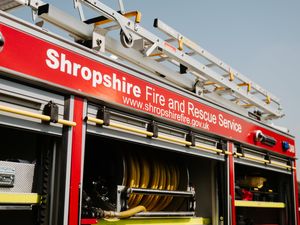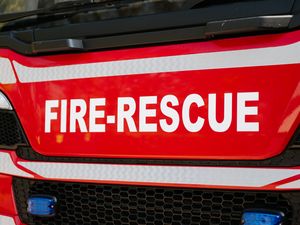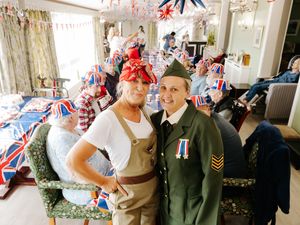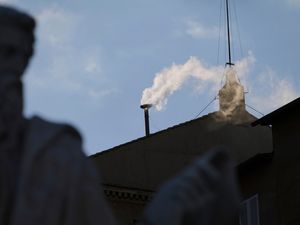Shropshire father's poignant trip to where hero son died in Basra
A crumbling wall was all that was left at the spot where Senior Aircraftsman Chris Dunsmore was killed in action while serving in Basra.
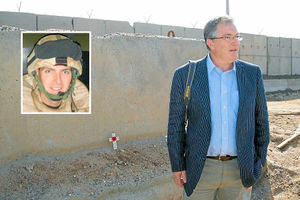
He died in a mortar attack on July 19 2007 – the day he was due to fly home to visit his father.
Now his father Geoff has been to the spot where 29-year-old Chris died – and placed a small cross bearing a poppy in his memory.
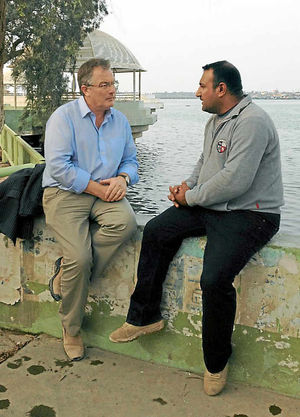
"Visiting the area where Chris died was poignant but also quite strange," said Mr Dunsmore, who lives in Churchstoke on the Shropshire/Mid Wales border.
"The portable buildings that Chris was sheltering in have been removed, but we were able to locate the spot.
"Since the time he died it has become a dumping ground so it was hard to navigate, hot, dusty and messy.
"I took with me a cross with a poppy on to lay in the spot where he was killed and there was not much to leave the cross on, so I had to place it on a bomb blast wall which was, in itself, quite significant.
"I had always wanted to go and visit the spot and it felt like Chris was with me while I was there helping me through it.
"Chris used to say I was his inspiration but in the years since we lost him I have found that it has been the other way round – he has inspired me."
Senior Aircraftsman Dunsmore was a member of 504 Squadron Royal Auxiliary Air Force Regiment based at RAF Cottesmore in Leicestershire. He became the first RAF auxiliary to lose his life in action since the Second World War.
Mr Dunsmore, a retired headteacher from Devon who moved to Mid Wales for a fresh start last year, says he met people he now considers as lifelong friends on the trip. They include Mazin Altayar, from Basra, who not only showed Geoff around but also named his son Chris in memory of the airman.
Mr Dunsmore said he did not feel nervous visiting the country despite the emotional ties and said it was through speaking to Iraqi locals that he learned of their thanks for the efforts of British forces in the country.
He said: "I found the Iraqi people absolutely incredible and I have made some friends for life over there. I met so many people who are grateful for what Chris was doing and they were all sympathetic and grateful that Chris had sacrificed himself in a bid to get Saddam Hussein to go.
"When I first got to Iraq people were staring at me and looking and wondering who I was, but when they found out I wasn't a politician they were very welcoming."
The BBC invited Mr Dunsmore to make a documentary about his visit, which was shown on BBC 2 last night in the week of the 10th anniversary of the start of the Iraq war.
"It was called 'Iraq: Did My Son Die in Vain?' and I have never, for one minute, thought Chris did. It was originally set to be a documentary with a lot of families, but in the end it came down just to myself.
"Being out there and talking to Iraqis, I found it is the invasion itself for which there is bad feeling about, they are very positive about many other things.
"I carried out an emotional interview at the start of my fortnight in Iraq, between myself and a Iraqi family but at the end they invited me to stay for something to eat. For an Iraqi family to invite you to eat with them, it is really something special."
Mr Dunsmore said he now feels like more should have been done by our troops to help the country in the long run.
"There is amazing positivity out there but I think our forces should have stayed out there longer to set up the infrastructure," he said.
"One of things Chris did was bring water to a village with his squadron and that seed the forces had sown during those years has now definitely grown into a seedling, which might have been more if they were there for longer."
Mr Dunsmore said he feels Chris has been with him since the moment he was told he had died.
"When the captain came and told me about Chris dying, a large frame came off the wall and landed upright on the floor balancing. Then some bowls fell to the floor but didn't smash and I thought 'Chris is home' and the captain gave me such a wide-eyed look," he said.
"Then at another important time in my life after winning an important employment tribunal, as I stopped to buy some champagne on the way home I got out of the car and there was an RAF Hercules flypast." But perhaps the most special coincidence was the appearance of two poppies in his garden the year after Chris died.
"I had never before had any poppies in my garden, then the year after he died one appeared with two flowering buds. The one opened on the anniversary of his death, the other opened 10 days later on what would have been his birthday," he added.
"I feel he is always with me, guiding me and I am a proud father."
The Iraq war saw the death of 120,000 civilians and troops – including 179 British servicemen. It ultimately led to the overthrow and execution of Saddam Hussein.
On Tuesday – the 10th anniversary of the start of the conflict – former Prime Minister Tony Blair stood by his decision to go to war.
He said Iraqis would have rebelled against Saddam Hussein if there had been no invasion and it would have been 'a lot worse than Syria'.
Asked if he had regrets, he said: "How can you regret removing a monster who created enormous carnage?"

